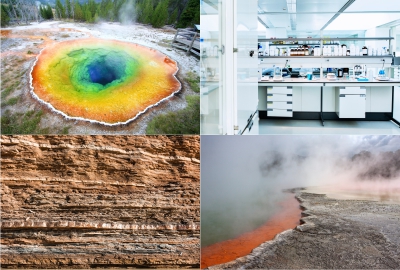Biogeosciences (Earth System Sciences) examines the interplay between organisms and their environment and how its expressed in natural archives and the geological record. This discipline is vital for comprehending the origin of life on our planet, predicting its future evolution, investigating the possibility of extraterrestrial life, and probing how human perturbations including climate change are affecting current life and ecosystems.
 How are elements and chemical compounds cycled and transformed in natural systems including understanding the role of microorganisms and other life?
How are elements and chemical compounds cycled and transformed in natural systems including understanding the role of microorganisms and other life? - How do microorganisms affect mineral dissolution and precipitation?
- Where are viable habitats for life and what are the requirements for thriving ecosystems?
- What insights can we draw from studying Earth about the potential for life on other worlds?
- How can studying past changes in organisms including plankton tell us about how the climate and chemistry of the Earth has changed on land and in the ocean?
- How has the chemistry of the oceans evolved over time?
- How are contaminants released into the environment transported, transformed and removed from natural systems?
- How are human activities including climate change changing biogeochemical cycles on Earth?
| Faculty | Areas of Interest |
|---|---|
| Sarah Ariano | hydrology, biogeosciences, environmental sciences, water resources |
| Bridget Bergquist | metal geochemistry |
| Jörg Bollmann | paleoceanography, geobiology, paleoecology |
| Maria Dittrich | biogeosciences |
| Sarah Finkelstein | climate science, paleoclimatology, paleoecology, micropaleontology, wetland biogeosciences |
| Dan Gregory | hydrothermal ore systems |
| Jochen Halfar | paleoclimatology, geobiology |
| Marc Laflamme | invertebrate paleontology, geoscience pedagogy |
| Barbara Sherwood Lollar | stable isotope geochemistry, hydrogeology |
| Ulrich Wortmann | marine geology, paleoceanography, carbon and sulfur cycling, geomicrobiology |


